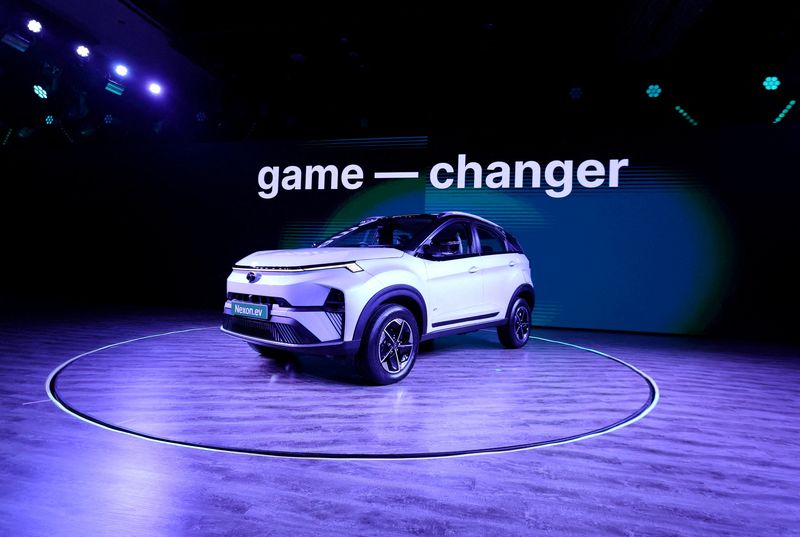Tata Motors lobbies India not to lower EV import taxes as Tesla looms-sources

FILE PHOTO: Tata Motors’ electric vehicle Nexon.ev is displayed during its launch in New Delhi, India, September 14, 2023. REUTERS/Anushree Fadnavis/File Photo
TSLA
+1.34%
Add to/Remove from Watchlist
Add to Watchlist
Add Position
Position added successfully to:
Please name your holdings portfolio
Type:
BUY
SELL
Date:
Amount:
Price
Point Value:
Leverage:
1:1
1:10
1:25
1:50
1:100
1:200
1:400
1:500
1:1000
Commission:
Create New Watchlist
Create
Create a new holdings portfolio
Add
Create
+ Add another position
Close
TAMO
-0.86%
Add to/Remove from Watchlist
Add to Watchlist
Add Position
Position added successfully to:
Please name your holdings portfolio
Type:
BUY
SELL
Date:
Amount:
Price
Point Value:
Leverage:
1:1
1:10
1:25
1:50
1:100
1:200
1:400
1:500
1:1000
Commission:
Create New Watchlist
Create
Create a new holdings portfolio
Add
Create
+ Add another position
Close
By Aditi Shah and Aditya Kalra
NEW DELHI (Reuters) -Tata Motors is pressing Indian officials not to lower import taxes of 100% on electric vehicles and to protect domestic industry and its investors, as the government reviews Tesla (NASDAQ:TSLA)’s plans to enter the market, people with direct knowledge said.
As India tries to boost domestic manufacturing and EV adoption, Tesla is proposing to set up an Indian factory, but is demanding lower import taxes for electric cars.
India is working on a new policy to cut import taxes on EVs to as low as 15% for companies committing to some local manufacturing. The policy could allow Tesla to set up its India factory to make its proposed $24,000 car, while importing its more expensive models with lower tax.
Tesla’s strategy is a departure from its failed plan last year when it just pushed India to lower duties.
In meetings with Prime Minister Narendra Modi’s office and other departments, Tata has opposed the plan, arguing that its investors made decisions assuming the tax regime favouring locals will remain unchanged, two sources with knowledge of talks said.
Tata and Modi’s office did not respond to requests for comment.
Tata is also arguing that India’s EV players need more government support in the early growth stage of the industry, pointing to imported gasoline or diesel cars which are still taxed at up to 100% despite the industry being well developed, said the first source.
«Lower duties will hit the entire (domestic) industry,» the person said, adding «the investment climate will get vitiated.»
Tata, one of India’s biggest carmakers, started its EV business in 2019. Private equity firm TPG and Abu Dhabi state holding company ADQ invested $1 billion in 2021, valuing the EV business at around $9 billion, and the second source said lower duties for foreign players could risk future fundraising.
India’s EV market is small, but 74% of the 72,000 electric cars sold so far this year are made by Tata.
Tesla, which is losing share in an increasingly crowded U.S. market, has its sights set on the potential of India’s auto market, one of the world’s biggest where more than 3 million cars are sold each year. EVs still account for a tiny share in India, but Modi’s government is promoting the use of clean cars and the sector is rapidly growing.
Modi has been directly overseeing talks with Tesla since his meeting with CEO Elon Musk in New York in June.
The domestic car industry had lobbied hard against Tesla’s previous plan for India to lower taxes and succeeded, with a Tata Motors (NYSE:TTM) executive saying in late 2021 the move would run «contrary» to the government’s Make-in-India push.
INDIAN GOVERNMENT’S VIEW
Another Indian player, Mahindra & Mahindra, which has raised around $400 million from Singapore’s Temasek and British International Investment, has also raised concerns with officials about the lower EV tax plan, said a third source, a senior federal official involved in policymaking.
Mahindra declined to comment.
New Delhi, said the third source, is trying to soothe concerns of local automakers, but India remains determined to make EV sector entry for foreign players easier to help meet its goals.
Modi wants 30% of annual car sales in India to be electric from 2030 compared to the current 2%. Charging infrastructure is in its infancy too.
«We will come out with a policy that addresses everyone’s fears,» said the official, adding one option was to lower import taxes only above a certain price point.
India’s current EV import tax of 100% is for cars priced above $40,000 — which applies to most Tesla models. Tata has three EV offerings, priced $10,400 to $24,000.
«If India needs to be an EV hub, we need more manufacturers … Local industry need not fear that Tesla or anyone else will wipe them out,» said the Indian official.
India’s talks with Tesla come as other countries are courting the U.S. giant.
This week, Thailand’s Prime Minister said he showed Tesla executives around as they are looking for land, saying he was confident the company would invest in the country.


